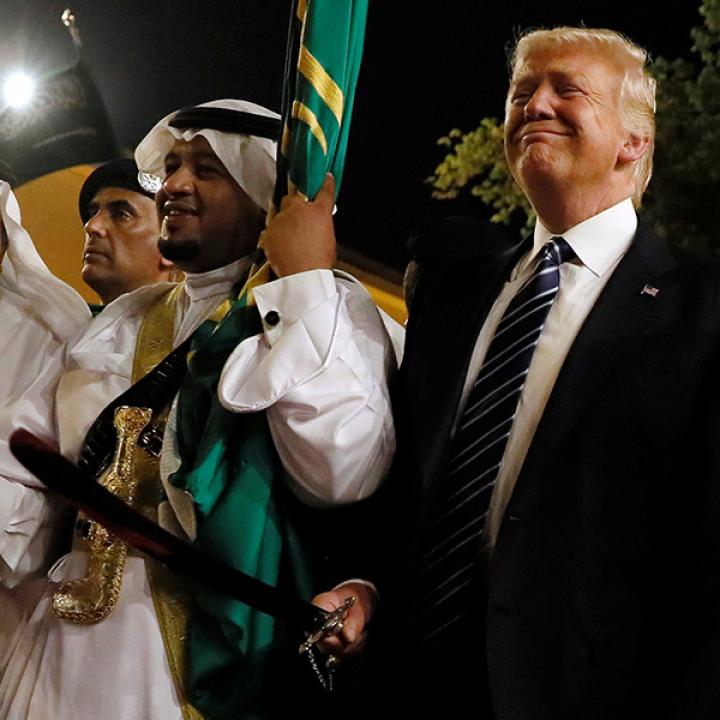
- Policy Analysis
- Articles & Op-Eds
Expect the Unexpected with Trump and the Gulf
Also published in Arabian Gulf Business Insight

Whatever the new administration decides on major regional issues—from Gulf involvement in postwar Gaza to next steps on Iran—local leaders should be prepared to wait awhile and brace for surprises.
Greetings from Washington, where we have a ringside seat to watch the first days of the second Trump administration. Lots of the action is taking place a couple of miles from my home. Motorcades can disrupt simple errands. Friends are getting jobs—or not. Biden-supporting Democrats are in deep depression.
Perhaps perversely, the subject dominating conversation is not President Trump but rather the weather. It has been record-breakingly cold, hence Monday’s ceremony taking place inside Congress rather than in the open overlooking the Mall. Piles of snow and icy sidewalks are judged the greater imminent peril for many.
Apart from keeping warm, people are trying to make sense of what is happening. But this is mainly for themselves and America domestically: the US can be very parochial. The wider world is left trying to interpret what a few foreign policy phrases, either in formal speeches or in throwaway lines to journalists, may mean.
For the Gulf, “drill, baby, drill” in Trump’s inauguration speech is likely to have prompted groans of disappointment. Oil prices have held up in the past few days, but the longer-term trend can now be predicted to be downwards, faster.
The comment may well have prompted Crown Prince Mohammed bin Salman to call Trump late on Wednesday to promise $600 billion of Saudi investment in the next four years. The kingdom’s Public Investment Fund has the money, but an immediate impact may well be slower investment at home on Vision 2030.
A further groan probably followed Trump’s comment that he may make his first foreign visit to Saudi Arabia, as he did in 2017, if Riyadh promised to buy another $450 billion of “our product,” presumably military equipment. He added that “$500 billion” would be preferred, to allow “for all the inflation.”
On Biden’s first day in office back in 2021, the ex-president had announced the climate crisis and quickly put climate change at the centre of US foreign policy. But Trump has flipped, announcing that high energy prices are a threat to the American people, and he has withdrawn the US from the Paris climate accord.
Offshore wind farm projects are likely to be completed but do not expect any more (at least for four years). Solar seems also to have a doubtful immediate future.
The word “Iran” was not in his inauguration speech, prompting the immediate judgment that he favours diplomacy rather than military action. His Monday midnight firing of Brian Hook, the hawk who had been leading his Iran transition team, added weight to this point of view.
The “Mar-a-Lago effect” was blamed by some for this surprise decision—a reference to informal policy discussions being impacted by personality differences with factional rivals who, perhaps crucially, hung out with Trump at his Florida residence.
Gaza formed a backdrop for Trump’s speech at the indoor Capital One sports and entertainment arena, a second cold weather replacement for what should have been a march in front of the White House. A group of yellow-scarved Israeli relatives of the hostages, plus one hostage released earlier, were given pride of place behind the President, although his message of support was then horrifically muddled by him referring to the January 6 (2021) insurrectionists who stormed Congress also as hostages.
The notion of a post-Hamas Gaza, and a Gulf, specifically a UAE, role in its administration, mediated by Trump, seems far-fetched, at least this week. Sunday’s release of three Israeli hostages, amid chaotic scenes of Hamas fighters in Gaza City, suggests the limits of Israel’s victory in the Strip so far. Trump has been quick to take credit for the hostages’ release, at least in part by pressuring Israeli Prime Minister Benjamin Netanyahu. The next two parts of the deal have yet to play out, as well as any arrangement for the release of the rest of those held captive.
Qatar’s role as a mediator appears to have been crucial. It prompted a meeting at this week’s Davos conference in Switzerland between the Israeli president, Isaac Herzog, and Mohammed bin Abdulrahman Al Thani, Qatari prime minister (and foreign minister).
Both men had spoken to separate audiences but met afterwards. To the surprise of many familiar with public Israeli antagonism towards Qatar, it was acknowledged on the website of the Israeli Ministry of Foreign Affairs.
US-supported normalisation between Israel and Saudi Arabia still seems possible, although quite how and when is a matter of speculation. It is hardly a low-hanging fruit.
China and Russia seem to be the bigger issues in Washington. Beijing may be anxious for new diplomacy. A vice-president attended the inauguration in what was interpreted as a significant goodwill gesture.
But do not expect anything too quickly, short of a surprise event in the US or somewhere in the world. The new administration may want to give the impression of hitting the ground running, but appointments and Senate confirmations take time.
In Gulf terms, the crucial indicator perhaps should be who comes to Washington first rather than where Trump makes his first foreign trip. The answer, at least at the moment, seems likely to be Netanyahu in February, who may be pushing a breakthrough with Saudi Arabia or support for Israel’s position in Gaza. Patience is necessary and, especially with Trump, expect the unexpected.
Simon Henderson is the Baker Senior Fellow at The Washington Institute and director of its Bernstein Program on Gulf and Energy Policy. This article was originally published on the Arabian Gulf Business Insight website.



